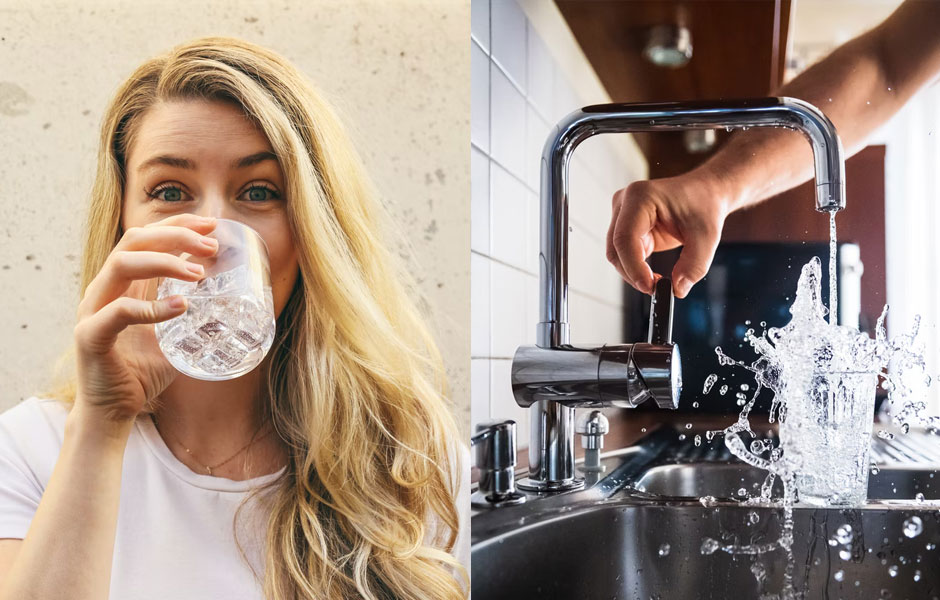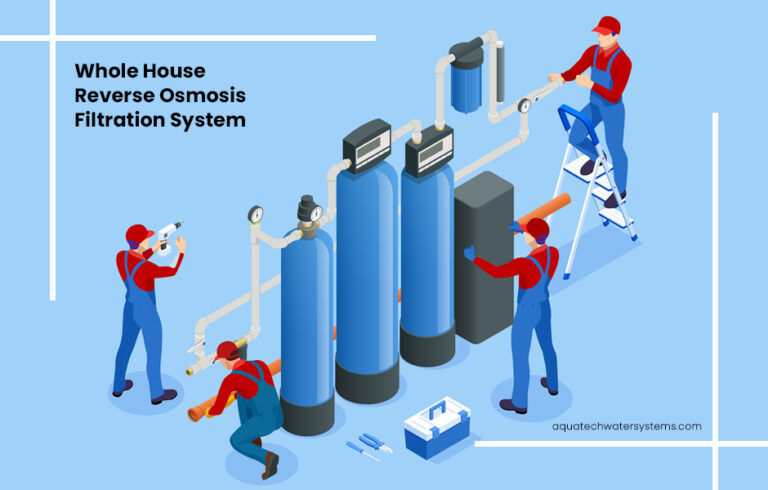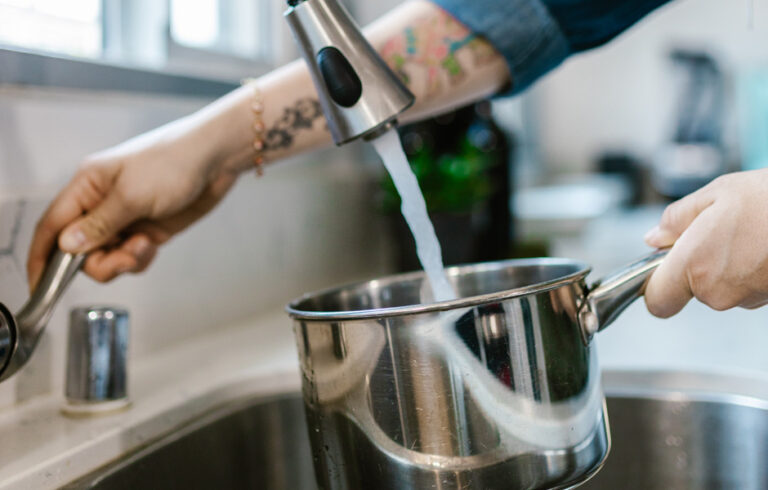Do you want to improve the quality of your water? A whole-house water filtration system is a great way to ensure that your family has access to clean and safe water. The system will not only protect your loved ones from harmful contaminants, but it can also save you money on your monthly water bill.
This article will discuss the different types of whole-house water filtration systems available on the market, their benefits, how they work, the costs involved, and how to choose a filtration system for your home or office.
What is a whole house water filtration system?
A whole house water filtration system is installed on the main water line entering your home. This means that all the water coming into your home will be filtered, including the water you use for drinking, cooking, bathing, and washing.
Whole house water filtration systems can effectively improve the quality of your family’s water supply. If you are concerned about the quality of your water or its taste, a water filtration system that can cater to the entire house may be a good option for you. There are a few different types of systems available, so be sure to do your research to find the one that best meets your needs.
How does a whole house water filtration system work?
A whole house water filtration system typically consists of three main parts: a sediment filter, a carbon filter, and a preferred choice of filter, for example, a water softener or an RO filter. These three components work together to remove impurities from your water supply.
- The sediment filter is the first line of defense against water contaminants. It works by trapping dirt, sand, and other particles that may be present in your water supply.
- The carbon filter then removes chlorine, lead, harmful chemicals, and other pollutants that can cause bad taste and odor in your water.
- You can either use a water softener or reverse osmosis in the third stage. Some people also choose the water softener as a third filtration system and reverse osmosis as the fourth one. The water softener helps to reduce hardness in your water, making it softer and easier on your skin, hair, and internal organs. The reverse osmosis removes the contaminants entirely, purifying your water to a greater degree.
How do you know if you need a whole house water filtration system?
If you are not happy with your water quality, it may be time to consider a whole house water filtration system.
There are a few ways to test the quality of your water, including sending a sample to a water testing lab or using a water test kit at home. However, the most preferred way is to have your water tested by a professional. They will be able to tell you what contaminants are present in your water and suggest a course of treatment.
You may also notice physical signs indicating something is wrong with your water, such as stains on fixtures or an unpleasant taste or odor. If you notice any of these red flags, it’s time to take action and find out what’s causing the problem.
What are the benefits of having a whole house water filtration system?
If you’re like most people, you probably take the quality of your water for granted. But did you know that there could be contaminants in your water that can pose serious health risks?
According to the Environmental Protection Agency (EPA), there are over 90 contaminants that can be found in water, including lead, mercury, and arsenic.
While your local water treatment plant does a great job removing many of these contaminants, they do not ensure a complete purification of the water being supplied. Below are some of the most sought-after benefits of installing a whole house water filtration system.
Improved water quality
A whole house water filtration system will remove pollutants like lead, chlorine, and other chemicals from your water supply, resulting in purified water. This means that you and your family will be able to enjoy cleaner and safer water.
Better tasting water
Contaminants can cause your water to taste unpleasant. A whole house water filtration system will remove these impurities, making the water you drink not taste foul.
Protection for your appliances
If you want to ensure a longer lifespan for your appliances, installing a whole house water system in the office or at home is a great way to do so. It protects your plumbing system by trapping sediment and other particles before they have a chance to build up and cause damage.
Reduced costs
A whole house water filtration system is a wise investment that will save you money in the long run. By filtering your water, you will not need to buy bottled water, which can be very expensive in the long run.
Peace of mind
Another benefit of having a whole house water filtration system is that it offers peace of mind. Knowing that your family is using clean water can give you a sense of security and help you sleep better at night.
What are the different types of whole house water filtration systems?
There are a few different types of whole-house water filtration systems to choose from. The most common type is a point-of-entry (POE) system installed at the main water line coming into your home. POE systems effectively filter all of the water entering your home, so every water source is filtered, including showers, faucets, and toilets.
Speaking about whole-house water filtration, I’d suggest these four different types of whole-house water filtration systems available on the market:
- Activated carbon filters
- Reverse osmosis systems
- Water softeners
- Water distillers
Activated carbon filters
Activated carbon filters are the most common type of whole-house water filtration system. They work by trapping particles and contaminants in the water as it passes through the filter. The trapped contaminants are then removed when the filter is replaced.
Reverse osmosis systems
Reverse osmosis systems are more expensive than activated carbon filters, but they offer a higher level of filtration. They work by forcing water through a semipermeable membrane that separates it from dissolved minerals and other contaminants. This type of system is ideal for households with water that is high in minerals or other contaminants.
Water softeners
Water softeners work by exchanging ions in the water with ions of a different charge. This exchange removes hardness minerals from the water, making it softer. Water softeners are ideal for households with hard water.
Water distillers
Water distillers work by boiling water and condensing the steam back into the water. This process removes all impurities from the water, including dissolved minerals and contaminants. Water distillers are the most expensive type of whole-house water filtration system, but they offer the highest level of filtration.
Some of the other most common types of water filtration systems are –
Mechanical filters
This is the type of water filter that most people are familiar with. It uses a physical barrier to remove impurities from water, such as sediment and rust.
Chemical filters
These filters use chemicals to remove impurities from water. The most common chemical filter is a carbon filter, which removes chlorine and other chemicals from water.
UV Water filtration
This is a relatively new type of water filtration that uses ultraviolet light to kill bacteria and viruses. It is effective in removing microorganisms from water, making it safe to drink.
Ion exchange water filtration
This type of water filtration system removes impurities by exchanging ions in the water with ions from a solid, such as resin beads.
How to choose the best whole house water filtration system?
To choose the best whole-house water filtration system for your home, you must consider your water needs and budget. If you have a large family or live in an area with a high level of water contaminants, you will need a more robust system. If you have a smaller home or your water is relatively clean, you can choose a less expensive system.
Having said that, let’s take a look at some of the factors that you should consider when choosing a whole house water filtration system:
Flow rate for filtration
The flow rate is the measure of how much water can be filtered in a certain amount of time. It is essential to choose a water filter with a high flow rate to get clean water quickly.
Certifications
It is important to choose a whole house water filtration system that has been certified by a third-party organization, such as NSF International or the Water Quality Association.
Warranty
Most whole house water filtration systems come with a warranty. It is important to choose a system with an extended warranty so that you can be covered in case of any problems.
Micron rating of water filters
The micron rating is the measure of how small impurities can be and still be filtered by the water filter. It is important to choose a water filter with a low micron rating to be sure that all impurities will be removed from your water.
Design and installation
The design and installation of a water filter are important considerations. Choosing a water filter that can be easily installed and has a practical and preferable design is important.
Quality of water
Quality of water supply can help you narrow down your search for a whole house water filtration system. If you have city water, your water has been treated for impurities to some extent. Municipal water can, however, contain chlorine and a few other contaminants. If you live in an area with hard water, you may want to consider a water filtration system that can remove hardness from your water.
If you have well water, it is important to have your water tested for impurities before choosing a filtration system.
Contaminants present in water
Some whole house water filtration systems are designed to remove specific impurities, while others are designed to remove various impurities. Some more effective water filters tend to remove all the impurities in your water.
An expert can tell you which water filtration system will work best depending on the presence of sediments, rust, pesticides, microorganisms, chlorine, lead, mercury, chloramines, and volatile organic compounds.
Your budget
One of the most important things you need to consider is your budget. Water filtration systems can range from a few hundred dollars to several thousand dollars. Therefore, you need to decide how much you are willing to spend on a water filtration system before you start shopping.
The size of your home or office
Your home or office is another important factor to consider when choosing a whole house water filtration system. You may not need a very powerful water filtration system if you have a small home. On the other hand, if you have a large home or office, you will need a more powerful and effective water filtration system to purify all the water.
Water usage
The next thing you need to consider is the amount of water you use. If you use a lot of water, you will need a more complex filtration system with more features. If you use a small amount of water, then you can get away with a water filtration system that has the basic functionality.
Portability
Another thing to consider is whether or not you need a portable water filtration system. Some whole house water filtration systems can be installed permanently, while others are designed to be portable. If you plan to move soon or travel often, it may be worth investing in a portable water filtration system.
The cost of installing a whole house water filtration system
The cost of a whole house water filtration system depends on a few factors, such as the type and size of the system, the complexity of the installation, and the water quality in your area. Generally speaking, you can expect to spend anywhere from $500 to $5000 on a whole house water filtration system, depending on whether you need one for your home or a much larger office.
So, if you consider installing a whole house water filtration system, it is important to consult with a professional to find out which type of system would suit your need.
An expert can also help you determine the best location for the system and install it properly. Improper installation can lead to problems, such as water leaks or decreased water pressure.
Maintenance of a whole house water filtration system and its costs
When choosing a whole house water filtration system, it is important to consider the costs of both initial installation and ongoing maintenance. While some systems may be more expensive upfront, they may save you money in the long run by reducing your water bill or eliminating the large maintenance charges.
The first and periodic method of maintenance is routine clean-up. This can be done at home without the need to pay a frequent service charge.
- You should regularly clean the parts of the system, such as the sediment trap and brine tank.
- Checking the filters and replacing them when necessary becomes an inevitable part of maintaining a water filtration system, and we recommend doing so annually.
- Installing newer parts as and when needed can be a great assurance to drinking and using purified water.
You can expect to pay anywhere from $100 to $600 per year to maintain your whole house water filtration system. This includes the cost of replacing filters and other parts as needed.
If you live in an area with hard water, you may also need to descale your system periodically to prevent it from becoming clogged.
Compared to bottled water, which can range from $0.50 to $12 per gallon, the cost of maintaining a whole house water filtration system is very reasonable. In addition, you will feel good that your family is drinking safe and clean water, which can eventually cut down the pharmacy bills.
FAQs
Where should a whole house water filter be installed?
A whole house water filter should be installed at the main water supply line before the water enters your home. This way, all the water that flows into your home will be filtered, ensuring that you and your family have access to clean and safe water.
How often should you change parts of a whole house water filtration system?
The frequency of changing a whole house water filter will depend on the type of system you have and your water quality. For most systems, it is recommended that you change the filters every six months to one year. However, if you live in an area with hard water, you may need to change the filters more frequently.
Is it worth getting a whole house water filtration system?
If you are concerned about the quality of your water and the potential health risks associated with consuming contaminated water, then a whole house water filtration system is worth considering. Not only will it give you peace of mind, but it will also provide you and your family with access to clean and safe water.
How do I choose a whole house water filtration system for well water?
If you have a well, you may be wondering if you need a whole house water filtration system. The answer is yes! While your well water is likely to be of good quality, contaminants can still find their way into your water supply. A water filtration system that can remove the types of pollutants present in your well water is best suited.
Can a whole house water filter be installed outside?
Yes, a whole house water filter can be installed outside. However, it is important to remember that the system will need to be protected from the elements, such as snow and ice. If you live in an area with extreme weather conditions, it is best to consult with a professional before installing a whole house water filtration system.
How long do whole house water filters last?
The lifespan of a whole house water filter will depend on the type and quality of water in your area. While the entire filtration system can last up to years, it is recommended that you change the filters annually or, in some instances, even every six months.
Can a whole house water filter be installed sideways?
No, a whole house water filter should not be installed sideways. The system needs to be installed in a vertical position so that the water can flow through the filters properly.
Should a whole house water filter be installed before or after the pressure tank?
A whole house water filter should be installed before the pressure tank. This way, the water will be filtered before it is stored in the tank, and you will not have to worry about the contaminated water sitting in your tank.
How long does it take to install a water filtration system?
The installation of a water filtration system can take anywhere from a few hours to a few days, depending on the type of system you have and the complexity of the installation.
How much GPM do I need for a whole house filter?
The gallons per minute (GPM) will depend on the size of your home and the water pressure in your area. Therefore, it is best to consult with a professional to determine the GPM you need for your whole-house water filter.
What is the best micron size for a whole house water filter?
The best micron size for a whole-house water filter will depend on the type of water in your area. The 50-micron cartridges and filters are pretty popular. However, if you are unsure about which micron size to choose, it is best to consult with a water filtration expert.
Conclusion
Installing a whole house water filtration system is a great way to ensure that your family has access to clean, safe, and filtered water.
There are a few different types of whole-house water filtration systems available on the market, so you will need to consider your needs and budget before purchasing. Be sure to consider the cost of installation and ongoing maintenance when choosing a system.
It is quite clear that when compared to the cost of bottled water, the cost of maintaining a whole house water filtration system is very reasonable. In addition, you always have the security that your family is drinking safe and clean water.
We hope this guide helped provide you with an overview of everything you need to know about whole house water filtration systems.
This article was originally published in May-2022 and was last updated in Jul-2022
Author: Mark
Category: Water Filtration




